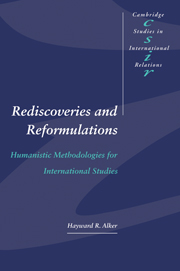Book contents
- Frontmatter
- Contents
- List of figures
- List of tables
- Acknowledgments
- Introduction: Voyages of rediscovery
- Part I Recovering Western antiquity
- Part II The humanistic science of the modern classics
- 4 The humanistic moment in International Studies: Reflections on Machiavelli and Las Casas
- 5 Can the end of power politics be part of the concepts with which its story is told? A Leibnizian reply
- 6 Rescuing “reason” from the “rationalists”: Reading Vico, Marx and Weber as reflective institutionalists
- 7 An Orwellian Lasswell: Humanistic scientist
- Part III Contemporary humanistic reformulations
- References
- Index
- CAMBRIDGE STUDIES IN INTERNATIONAL RELATIONS
4 - The humanistic moment in International Studies: Reflections on Machiavelli and Las Casas
Published online by Cambridge University Press: 13 January 2010
- Frontmatter
- Contents
- List of figures
- List of tables
- Acknowledgments
- Introduction: Voyages of rediscovery
- Part I Recovering Western antiquity
- Part II The humanistic science of the modern classics
- 4 The humanistic moment in International Studies: Reflections on Machiavelli and Las Casas
- 5 Can the end of power politics be part of the concepts with which its story is told? A Leibnizian reply
- 6 Rescuing “reason” from the “rationalists”: Reading Vico, Marx and Weber as reflective institutionalists
- 7 An Orwellian Lasswell: Humanistic scientist
- Part III Contemporary humanistic reformulations
- References
- Index
- CAMBRIDGE STUDIES IN INTERNATIONAL RELATIONS
Summary
As a student of international relations, most of my ostensibly successful voyages of scientific discovery have ended up at the edges of a misnamed continent. Sailing under the non-national flag of “the pursuit of truth,” I have come to see many of our concerns, theoretical models and methodological ways of defining research problems as parochial, scientistic, or even ethnocentric – crudely fashioned guides or tools for attempted “conquests” of already occupied and cultivated lands rather than the more innocent sounding “discovery and exploration” of a “New World.”
Believing he had only found the eastern edges of an already known Eurasian landmass (“the Indies”), Columbus also long resisted such a description of his discoveries. For different reasons, many of us agree: the opening up in 1492 of an already occupied “New World” for European exploration and conquest was not the original human “discovery” of two continents. But it was a fateful shock for the “old orders” in Europe, Asia and the Americas; so we may rightly consider “1492” as a major world historical turning point, symbolizing a more complex transition from the pre-modern to the modern age. Today we are faced with the comparable challenge of making sense of a postcommunist “new world order,” in what some describe as a “postmodern” era.
The positivistic exploratory approaches of my early research now appear inadequate for addressing such challenging reorderings of both space, time and human lives.
- Type
- Chapter
- Information
- Rediscoveries and ReformulationsHumanistic Methodologies for International Studies, pp. 147 - 183Publisher: Cambridge University PressPrint publication year: 1996

